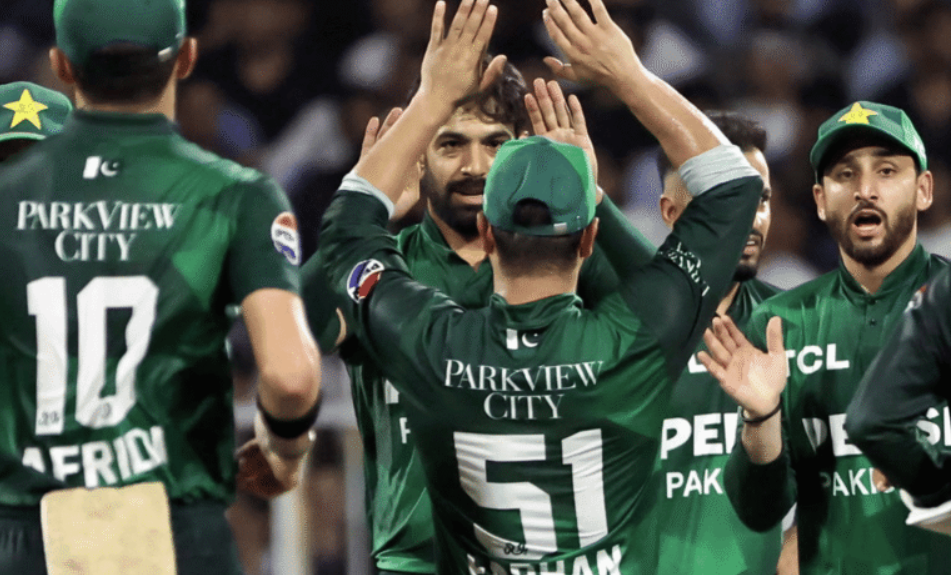Pakistan clinched the tri-series title with Mohammad Nawaz’s hat-trick and Salman Ali Agha’s batting heroics, but selection disputes and Aqib Javed’s rift with coaches raise bigger questions about Pakistan cricket’s readiness for Tier-1 challenges.
By Imran Malik
Pakistan capped off their UAE tri-series campaign with a thunderous 75-run win over Afghanistan in Sharjah, anchored by Mohammad Nawaz’s sensational hat-trick and match-winning 5 for 19 — earning him Player of the Series honors. Earlier, captain Salman Ali Agha’s unbeaten 53 and Haris Rauf’s four-wicket haul had set the tone with a 39-run opening win.
Why the PCB pits Pakistan against weaker teams: The tri-series offered a confidence-boosting warm-up ahead of the Asia Cup, allowing new line-ups and strategic combinations to be tested in low-pressure settings.
Standout performers:
- Best batsman: Salman Ali Agha led the charge with maturity and firepower in the opener.
- Best bowler: Mohammad Nawaz stole the show in the final, steering Pakistan to the title.
Behind the scenes: political tensions with Aaqib Javed
Reports suggest that interim coach Aaqib Javed is at odds with other officials — particularly over the batting order. He reportedly opposes slotting Babar Azam in the middle order and using Sahibzada Salman as an opener and keeper. No credible source confirms this, but it reflects deeper selection debates.
Can Pakistan challenge Tier-1 teams?
Yes — this performance shows both flair and depth. But longstanding concerns persist about administrative instability and inconsistent coaching. As one fan aptly put it:
“PCB leadership is the problem… How can you coach a team with ever-changing leadership? There’s no continuity.”
Bottom line: This tri-series win is a morale-boosting start. But if Pakistan is to convert this into success against elite opponents, it will require steadier management and a coherent selection strategy — not just on the field, but off it too.



12 Comments
It’s laborious to search out educated individuals on this topic, however you sound like you know what you’re speaking about! Thanks
Most of the things you point out happens to be supprisingly appropriate and that makes me ponder the reason why I hadn’t looked at this in this light previously. This particular piece really did switch the light on for me personally as far as this issue goes. But at this time there is one particular factor I am not necessarily too cozy with so while I attempt to reconcile that with the central idea of your issue, allow me see exactly what the rest of the readers have to say.Very well done.
There are actually plenty of details like that to take into consideration. That could be a great point to convey up. I supply the ideas above as common inspiration however clearly there are questions like the one you bring up where a very powerful factor might be working in honest good faith. I don?t know if best practices have emerged round issues like that, however I am positive that your job is clearly identified as a good game. Both boys and girls really feel the impact of only a second’s pleasure, for the rest of their lives.
Some truly nice stuff on this internet site, I like it.
Aw, this was a really nice post. In thought I wish to put in writing like this moreover – taking time and actual effort to make an excellent article… but what can I say… I procrastinate alot and not at all seem to get something done.
F*ckin’ tremendous issues here. I’m very happy to look your post. Thank you a lot and i’m looking forward to contact you. Will you kindly drop me a mail?
Very interesting topic, appreciate it for posting. “To have a right to do a thing is not at all the same as to be right in doing it.” by G. K. Chesterton.
Hi, Neat post. There is an issue together with your web site in web explorer, might check thisK IE nonetheless is the market chief and a huge section of people will omit your magnificent writing because of this problem.
F*ckin’ awesome things here. I am very glad to see your post. Thanks a lot and i’m looking forward to contact you. Will you please drop me a e-mail?
You could certainly see your expertise within the work you write. The arena hopes for more passionate writers such as you who are not afraid to mention how they believe. Always go after your heart. “If the grass is greener in the other fellow’s yard – let him worry about cutting it.” by Fred Allen.
There may be noticeably a bundle to learn about this. I assume you made sure good factors in features also.
I enjoy the efforts you have put in this, thanks for all the great posts.